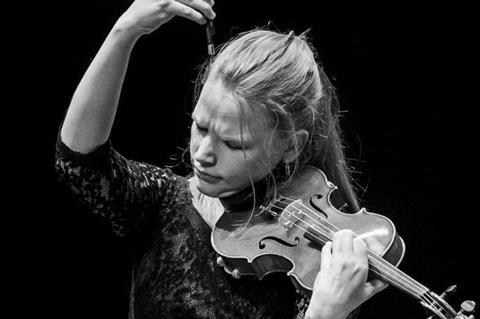The 24 year-old Dutch violinist, winner of this year’s Netherlands Violin Competition, has just started as a second violinist in the Concertgebouw. She discusses talent, solo and orchestral playing, and the difficulty of making the ‘right’ career decision

How did you come to the violin?
I saw an orchestra on television when I was two and told my parents that I wanted to play the violin. So I started in my local Suzuki class at the age of three. I didn’t practise much as a child; I spent about a year trying to learn ‘Twinkle Twinkle Little Star’. It was only when I was about 13 that I really began to take practice seriously.
How do you prepare for competitions?
When I was involved in the Concertgebouw Academy last year I had mental coaching alongside orchestra sessions and lessons. And during the sessions we did a lot of visualisation: I would imagine playing in a concert, and focus on telling a story through the music. It really helped; I started to think of my violin more as a translator than as an object. It also allowed me consider carefully what every musical passage meant to me. Then, when it came to performing, I was able to transfer those ideas to the stage.
- Read: Players of tomorrow: Johan Dalene
- Read: Players of tomorrow: Anna Agafia Egholm
- Read: Players of tomorrow: Maxim Tzekov
Do you prefer solo or orchestral playing?
To be honest I‘d never considered a solo career, so it was quite a surprise to me to win the Netherlands competition. Now that I have, I’m curious to see what it brings, as long as I can combine it with my orchestral schedule. Of course with solo playing you have more control over the story you’re telling, and how it sounds. But it’s also rewarding to experiment with colours in a group setting. Also, both orchestral and solo playing require a similar level of concentration. Yes, there’s a bit more pressure involved when performing by oneself. But just this morning, when I was in an orchestral rehearsal, the conductor asked the second violins to play a section by themselves, and I could feel myself getting nervous!
What is your biggest fear as a musician?
When I achieve something I worry that this is the best I’ll ever get, and that something like this will never happen again. Or if I have to choose between two things - for example two concerts on the same date - I worry that I will make the wrong decision, and that it will have a big impact on my future. But then I also tend to think that everything will be ok in the end, so that helps to balance things out.
What is the best piece of advice you have ever received?
To trust in my own ability, and remember that I tend to play better in concerts than I do at home, which gives me self confidence.
What matters more: hard work or talent?
This is a tricky one because when I was a small child people would tell me that I was very talented. There were some things that came quite easily to me, such as bowing. But then when I was 13, and started attending a Young Talent Department at the conservatory in The Hague, I was suddenly the worst of everyone: I played pieces that six-year-old children played. So I worked a lot, and it didn’t really pay off until I was 18 or 19. It just goes to show that talent doesn’t matter that much because I wouldn’t be anywhere now without the hard work.
What is your top practice tip?
Set a timer for twenty minutes and practise until it goes off. Do something mindless for five minutes like laundry or the dishes, then do another twenty minutes of practice, followed by another 5 minutes’ break, and so on. Dividing my day into blocks like this is very refreshing; otherwise I get tired and don’t concentrate. It can be hard to stop practising when the timer goes off, especially if you feel like you haven’t achieved what you wanted, but you have to just do it! And if you haven’t achieved your goal, have confidence that you will manage it in the next twenty minutes instead.











































No comments yet